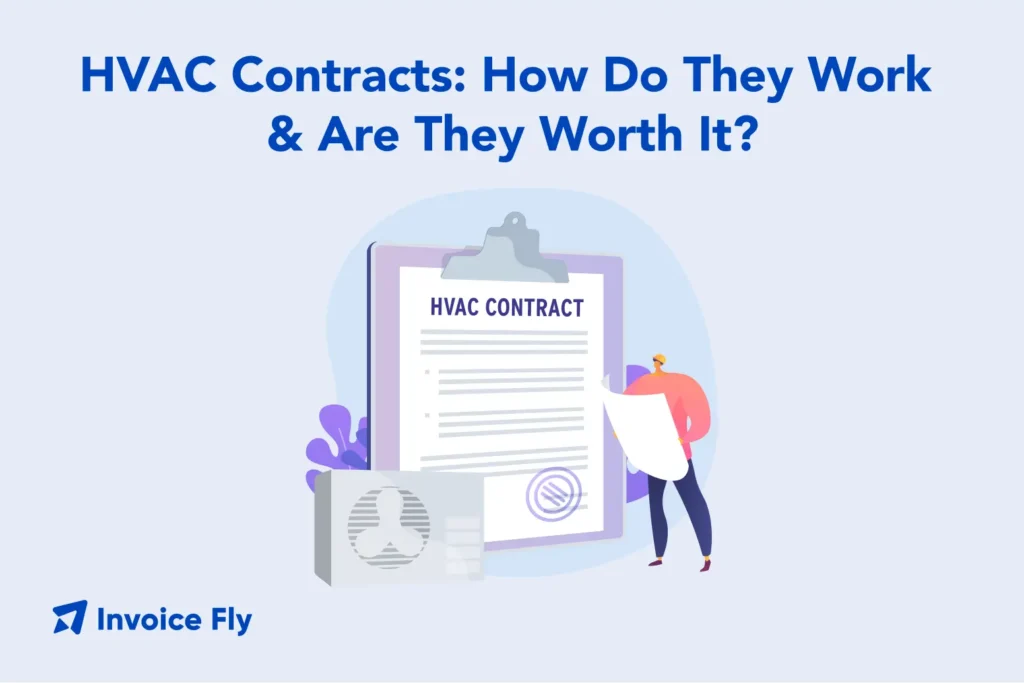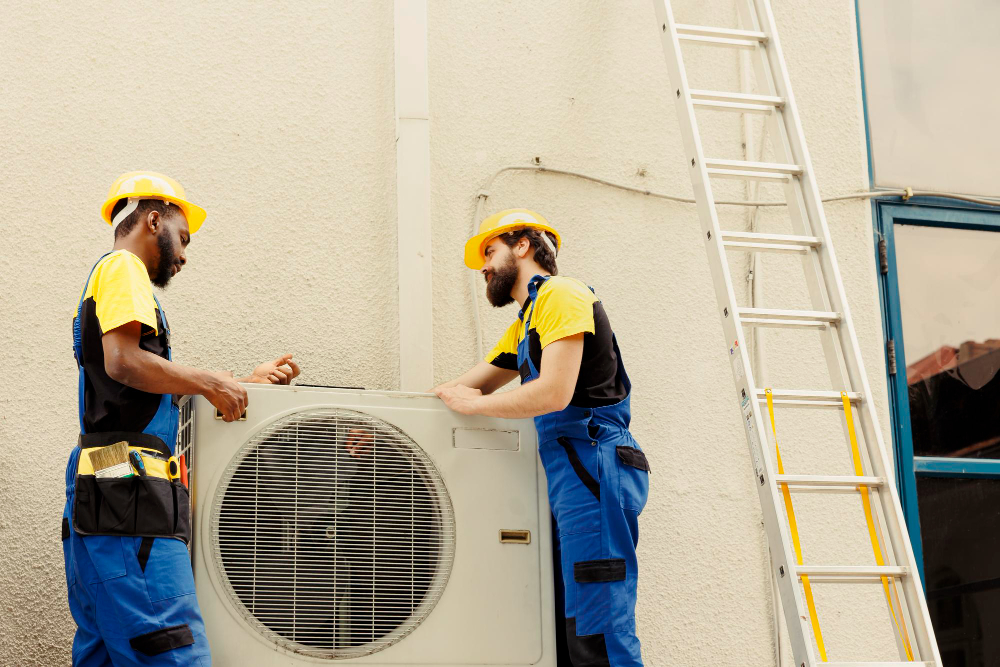HVAC Contracts: How Do They Work & Are They Worth It?

Table of Contents
- What is an HVAC service contract?
- 5 HVAC contract templates
- Benefits of offering an HVAC maintenance plan
- Residential vs. Commercial HVAC Contracts
- What to include in an HVAC maintenance agreement
- Common mistakes to avoid in HVAC contracts
- To Sum Up: Are HVAC service contracts worth it?
- FAQs about HVAC contracts
HVAC contracts are one of the most reliable ways for contractors to secure recurring revenue, build trust with customers, and ensure HVAC systems run smoothly year-round. Whether you’re a small business owner or a growing hvac company, offering hvac service agreements can reduce emergency calls, improve scheduling, and create a steady stream of income while delivering peace of mind to your clients.
This guide explains:
- How hvac contracts work
- What to include in them,
- If they’re worth offering in 2025
You’ll get a breakdown of essential elements, step-by-step templates, and tips on pricing and legal considerations. By the end, you’ll know exactly how to create HVAC contracts that protect your business, retain clients, and boost long-term profitability.
If you’re thinking about setting up contracts for the first time, our How To Start Your Own HVAC Business: Step-by-Step Guide can walk you through all you need to know.
What is an HVAC service contract?

An hvac service contract, often referred to as an hvac maintenance plan or hvac maintenance contract, is a legally binding agreement between an hvac company and a customer (either residential or commercial).
This contract stipulates that the hvac company will perform regular, routine maintenance on the customer’s heating and cooling systems for a set period, typically one year.
The primary goal is to keep the hvac equipment or cooling system running efficiently, prevent costly hvac repair, and provide the customer with peace of mind.
These agreements, sometimes called hvac annual service contracts, shift the customer relationship from transactional to long term, ensuring the mechanical system is covered for regular service.
For contractors starting out, check our guide on HVAC Marketing Strategy: Increase Marketing Profits in 2025 to position your service contracts effectively.
Get Started with Invoice Fly’s Software
Invoice Fly is a smart, fast, and easy-to-use invoicing software designed for freelancers, contractors, and small business owners. Create and send invoices, track payments, and manage your business — all in one place.

5 HVAC contract templates
While the specific design and content of hvac contract templates vary, most fall into a few main categories:
- Basic Residential Plan: Covers one to two maintenance visit services per year for a single home furnace and air conditioning unit.
- Premium Residential Plan: Includes all basic services plus discounted labor rates, priority emergency service scheduling, and possibly a warranty on new parts.
- Commercial Maintenance Plan: Tailored for a commercial site or warehouse, covering multiple units, often including air conditioning, and requiring specialized mechanical expertise. This maintenance plan’s scope of services is usually much broader.
- New Construction/Install Warranty: A temporary service agreement for a new home or construction project, covering follow-up maintenance and warranty labor after the initial install of the hvac system.
- Flex/Stock Plans: Offers a set number of service hours or a stock of common parts and labor pre-purchased for use over the long term, providing flexibility for larger organizations or property management department needs.
For inspiration on branding your plans, see HVAC Company Names: Ideas For Your New Branding.
Benefits of offering an HVAC maintenance plan

Offering hvac maintenance plans provides significant benefits for both the hvac company and the customer.
For the customer, the cost of an hvac maintenance plan is far less than the cost of a major hvac repair or having to prematurely install a new hvac system. The priority scheduling for emergency service and the long term peace of mind provided by routine maintenance are invaluable.
For the contractor, the value is in stability and profitability. The steady income from hvac maintenance contracts enables better financial planning and investment in new hvac equipment, vehicle fleets, or marketing and advertisement campaigns. It ensures a baseline of work throughout the year, keeping the labor team consistently happy and busy.
Related: Best HVAC Service List To Offer To Your Customers in 2025.
Residential vs. Commercial HVAC Contracts
Here’s how residential and commercial agreements typically compare:
| Feature | Residential Plan | Commercial Plan |
| Units covered | 1–2 (home furnace/AC) | Multiple (rooftop units, ducted systems) |
| Visit frequency | 1–2 per year | 3–6 per year |
| Cost range | $150–$300 annually | $1,000+ annually (depending on size/scope) |
| Added perks | Discounts on repairs, priority scheduling | Dedicated account manager, custom parts stocking |
| Common clients | Homeowners, landlords | Offices, warehouses, retail, schools |
Want to learn more about HVAC costs? Find more details in our HVAC Pricing Guide.
What to include in an HVAC maintenance agreement
A detailed and clear hvac service agreement is critical for protecting both parties. Ensure your hvac contract templates cover all necessary details.
- Business information
The full legal name, license number, and contact information (address and phone number) of the hvac company (e.g., HVAC LLC) responsible for the service. - Customer information
The customer’s full legal name and contact details, ensuring the contract is tied to the correct individual or commercial department. - Property address
The specific site or home address where the hvac system and equipment service will be performed. This is crucial for residential and commercial contracts alike, particularly for a new home or warehouse construction site. - Maintenance schedule
A clear outline of the number of maintenance visit services included, such as two annual visits (one for the air conditioning cooling system and one for the furnace). Specify when these routine maintenance visits will be set up. - Scope of services
This section clearly defines what the contract includes. The services include items like cleaning coils, checking refrigerant levels, inspecting electrical components, filter changes, and ensuring the whole system is in good working order. Clearly define what is not covered, such as major hvac repair or replacement of faulty hvac equipment. - Terms and conditions
The legal language of the agreement. This covers the duration of the hvac annual service contract, renewal terms, termination clauses, and limitations of the hvac company’s warranty and liability. - Invoice, schedule, and payment terms
Specify the total maintenance contract price, the payment schedule (e.g., one annual payment or monthly installments), and acceptable payment methods. - Legal requirements
Any specific legal clauses or state-required application language (e.g., Florida subcontractor requirements) must be included to ensure the hvac contract templates are fully compliant with local law. - Signature line
A section for the authorized signatures of both the hvac company representative and the customer, making the hvac contract legally binding.
Want an easier way to handle quotes and payments? Give Invoice Fly’s Invoice Maker a try — it’s free and built for businesses like yours.
Common mistakes to avoid in HVAC contracts

- Vague service descriptions – If customers think repairs are included when they’re not, disputes follow.
- Skipping legal review – Contracts should be checked against state requirements.
- Underpricing plans – If your annual contract costs less than one emergency call, you’re leaving money on the table.
- Forgetting renewal terms – Automatic renewal clauses can save you from re-selling the plan each year.
For more on building long-term careers in HVAC, check out HVAC Technician: What Do They Do & How To Become One.
To Sum Up: Are HVAC service contracts worth it?
Absolutely. For homeowners, contracts prevent unexpected repair bills and ensure reliable heating and cooling. For contractors, they stabilize revenue and strengthen customer relationships. Industry research shows that customers on maintenance agreements are far more likely to purchase replacements from the same contractor when systems reach end of life. That means contracts protect today’s revenue and also secure tomorrow’s big-ticket sales, too.Ready to put these agreements into practice? Simplify your process with Invoice Fly’s Invoicing Software — built to help HVAC businesses manage contracts, payments, and customers with ease.
Get Started with Invoice Fly’s Software
Invoice Fly is a smart, fast, and easy-to-use invoicing software designed for freelancers, contractors, and small business owners. Create and send invoices, track payments, and manage your business — all in one place.

FAQs about HVAC contracts
Yes. They cut emergency costs for customers and guarantee recurring revenue for contractors. For homeowners, it means fewer surprise bills; for contractors, it creates a steady income stream that makes planning easier.
Residential plans typically run $150–$300 per year, which usually covers two tune-ups. Commercial plans often start around $1,000 annually but can climb higher depending on the size and number of systems. More details in our HVAC Pricing Guide.
Start with templates that include all nine essentials. Review with a legal advisor. Learn more in our How To Start Your Own HVAC Business.
Use an Estimating App or our free Estimate Generator to calculate labor, equipment, and overhead.
Yes. The United States is seeing a growing demand for skilled hvac technicians. See our Average HVAC Salary Guide for 2025 and How to Get Your HVAC License.
